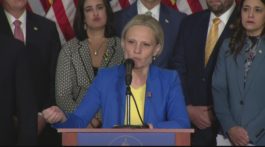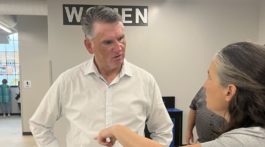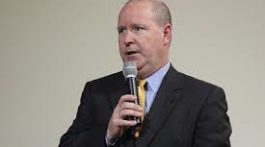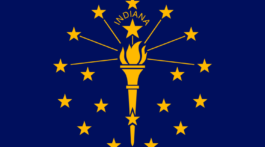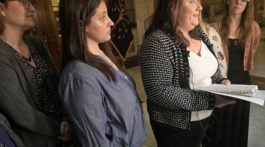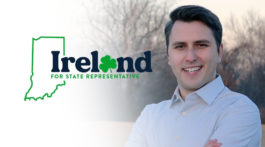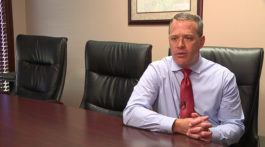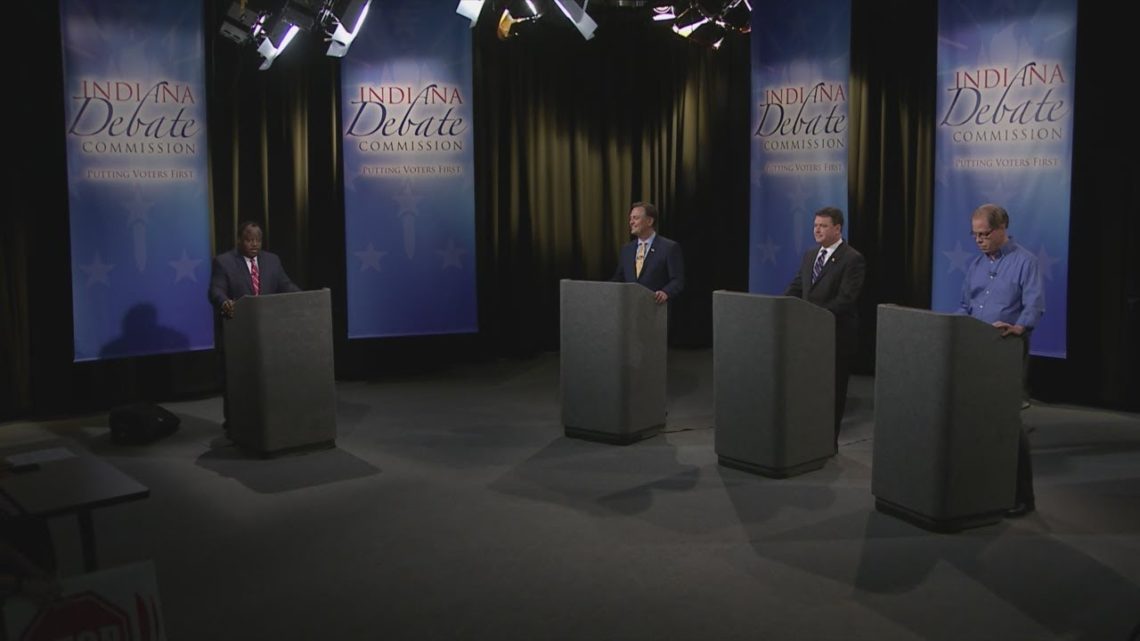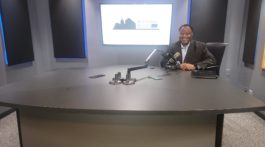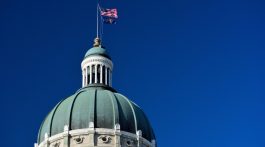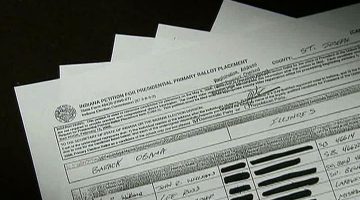by Leslie Bonilla Muñiz, Indiana Capital Chronicle
October 10, 2022
Debates between candidates for public office, particularly non-national races, don’t rake in viewers. Those that watch are unlikely to be swayed in their votes. And now, as candidates increasingly choose to sit them out, what’s the point?
Republican nominee for Secretary of State Diego Morales has declined. Numerous candidates in other congressional or statewide races haven’t or won’t as well.
“A political debate provides the best opportunity to compare the candidate side-by-side on the policy issues,” said Indiana Debate Commission President Elizabeth Bennion. “That’s why they are so important in helping to create an informed electorate — and why, as somebody who supports civic engagement and informed voting, I am trying to keep that tradition of political debates alive.”
More than a dozen groups joined forces to found the nonprofit, nonpartisan commission in 2007, which hosted its first gubernatorial debate in 2008. It remains the oldest of its kind in the country, according to its website.
There is the ability to strengthen the claim of a mandate if one is reelected, to say, ‘I did not simply buy my seat. … I did not rely solely on ads. I stood side-by-side. with my opponents and Hoosier voters chose me.
– Indiana Debate Commission President Elizabeth Bennion
The Commission still has a perfect candidate attendance record across 14 years and about two-dozen debates. That extends to this year’s single debate on October 16, when incumbent U.S. Sen. Todd Young, a Republican, will face off against Democrat Thomas McDermott and Libertarian James Sceniak.
But Bennion is worried that tradition is in danger.
“We have seen a movement of candidates refusing political debate,” she said. “That is troubling.”
Campaign managers often advise frontrunners not to debate, she said, because they’ve got the cash to push out messaging in pre-packaged paid advertising and don’t want to risk a live gaffe.
Already, candidates are declining — or ignoring — debate invitations from other organizations.
Missing piece
The nonprofit, nonpartisan League of Women Voters Indiana hasn’t put on a debate since it helped form the commission. But that’s changing this year, with an October 10 debate between Secretary of State candidates.
“When the Debate Commission decided they were only going to do one debate, the [U.S.] Senate debate, we looked at the Secretary of State race and said, ‘This is too important not to bring it to the attention of voters,’” said Co-President Linda Hanson.
“To have a debate elevates that race in voters’ eyes, and I think we decided that it was worth the effort to try to put this debate together,” Hanson added. “Because voters need to understand how crucial the Secretary of State role is in our elections.”
But the race’s frontrunner, Morales, didn’t respond to the league’s invitation. Democrat Destiny Wells and Libertarian Jeff Maurer will go on stage without him.
Morales told Fox59 in September that his focus was on “one-on-one” conversations with voters on the ground.
Asked about the benefits for wider contingencies of voters watching debates, Morales said, “They already know who they’re going to vote for. I’m trying to convince voters who will vote for me. I don’t think that my opponents will vote for me. I will not vote for them. So why would I need to?”
New normal
It’s a trend.
Hanson said obtaining full candidate participation had gotten “progressively worse” for the 20-plus local leagues in Indiana that hold debates for non-statewide races.
Hanson attributed some of the change to redistricting in 2010, when she said political parties in cities and states landed supermajorities in government and began to focus more on loyalists. Social media algorithms, which tend to envelop users in echo chambers of media they already agree with, haven’t helped, Hanson added.
Republicans in nine Hamilton County races skipped out on League of Women Voters of Hamilton County debates this month, prompting the county’s Democratic party to put out an indignant news release.
Last Monday, Fort Wayne’s WANE 15 canceled a debate between Third Congressional District candidates after U.S. Rep. Jim Banks pulled out, citing a prior commitment. He didn’t answer an attempt to reschedule, according to the broadcaster’s announcement.
When Banks told a WPTA reporter on Wednesday that he was open to debating, independent candidate Nathan Gotsch pounced.
Indiana Republican Party Chair Kyle Hupfer said debates are “one of many avenues” for his party’s candidates to communicate with voters.
“In this day and age, voters have more access to readily available information about candidates than ever before,” Hupfer said in a statement to the Capital Chronicle. “Whether it’s social media, websites, earned media, paid media, or anything else, it’s easier than ever before to be informed.”
“Furthermore, our candidates are more accessible than ever in all 92 counties,” he added. “We work hard to get our candidates and their positions out to the public, and we hope voters take advantage of these opportunities to get to know candidates.”
Why bother?
Political science experts and debate moderators acknowledged that for incumbents and other frontrunners, debating brings fewer strategic benefits and greater risks than for challengers.
“The reality is debates don’t get big ratings,” former WISH-TV reporter Jim Shella said. He moderated and covered numerous debates and panels over his three decades with the broadcaster.
“They may not mean a lot to the public — until they do,” Shella continued. “Until a candidate under pressure makes a mistake. And it becomes the talk of the campaign, which is what happened to [Richard] Mourdock.”
Mourdock’s comments on rape and abortion in a 2012 U.S. Senate debate with Democrat Joe Donnelly contributed to the Republican’s loss.
But a solid debate performance, Bennion said, can boost an incumbent’s legitimacy.
“There is the ability to strengthen the claim of a mandate if one is reelected, to say, ‘I did not simply buy my seat. … I did not rely solely on ads,’” she said. “‘I stood side-by-side with my opponents and Hoosier voters chose me.’”
“I think that’s a very powerful message that a well-funded incumbent can send to suggest that he or she is not hiding from the debate, is not concerned about being bested on the debate stage,” she added.
And although debates don’t typically lead viewers toward a different candidate, they can at least enable more informed understanding at the ballot box.
“There is a lot of scholarship that shows … it’s not necessarily going to radically change the balance of voters, or the margin in terms of the winning and losing candidate,” said Laura Merrifield Wilson, an associate professor of political science at the University of Indianapolis. Wilson is moderating both the league’s and commission’s upcoming debate.
“But it does change the process,” she said.
Indiana Capital Chronicle is part of States Newsroom, a network of news bureaus supported by grants and a coalition of donors as a 501c(3) public charity. Indiana Capital Chronicle maintains editorial independence. Contact Editor Niki Kelly for questions: info@indianacapitalchronicle.com. Follow Indiana Capital Chronicle on Facebook and Twitter.


